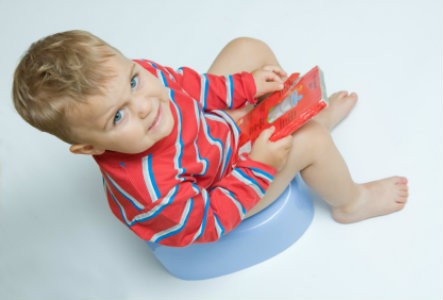
Is it better to have a potty seat in the family room or the bathroom? Better to use the big toilet or a little toilet? Better to initiate or let your child ask to nix the diapers? Pediatricians and potty experts offer their scoop on how to potty train with less mess and less stress.
5 Potty training must-knows
Learning to use the potty is a huge step in your toddler’s life — and your own. It may seem like a simple process… after all, you just poop and pee in the toilet, right?
There are a lot of options and circumstances though, and each kiddo is unique on how and when to go diaper free. Here are five things every parent should know before their potty adventure begins.
Understand the process
Learning to use the potty is a skill that must be worked on and mastered over a period of time, and don’t expect immediate results. “First, Baby has to be aware of the pressure sensations of his bowel and bladder,” writes Dr. William Sears, pediatrician and author of over 30 childcare books. “Then he must make the connection between these sensations and what's happening inside his body. Next he learns to respond to these urges by running to the potty, where he must know how to remove his clothes, how to situate himself comfortably on this new kind of seat and how to hold his urges until all systems are go. With all these steps, it's no wonder many babies are still in diapers well into the third year.”
Leave your emotions out of it
Don’t let your emotions undermine the process. Letting your frustration, anger or anxiety show to your child can have a detrimental effect on his progress. Take a step back from a potty situation that is rapidly spiraling downward and re-evaluate. Strive to maintain a neutral expression if you aren’t feeling chipper and positive. “The most important tip I give to parents is that they must relax in the presence of their child,” shared Bill Corbett, producer and host of the cable TV show for parents, The Parenting Show. “If a toddler detects even the smallest amount of stress or worry, it could freak them out over learning to eliminate, which is a huge milestone in life for them.”
Let your child lead the way
Susan Glaser, co-author of Who’s the Boss: Moving Families from Conflict to Collaboration, urges parents to let their child shoulder the responsibility for learning to use the potty — and not the other way around. “Children of potty mastery age are torn between wanting to be independent and wanting to remain a baby,” she explained. “Using a method which helps a child become the ‘boss of his body’ increases a child’s sense of self-worth — as well as being a highly effective way of getting the pee and poop in the right place! Rewards are not external treats but rather arise from the pride a child feels when he has used the potty.”
Make your home potty-friendly
There is no one-size-fits-all solution for potty seats. Some toddlers prefer small, stand-alone potties, while others do better with the big toilet. And there are even more variations — some prefer to poop in a little potty and pee on the big one. She also may appreciate a potty seat nearby, at least until she has mastered holding it for longer periods of time. Go with your little one’s flow. You might think about purchasing a small, foldable potty seat for your bag for potty time when you’re out — your child may prefer not dangling over a big toilet at Target.
Avoid pressure
Keeping the pressure off your little one is of utmost importance. Calmly explain to your little one that if she doesn’t use the potty then she may make a mess in her clothing or on the floor and let her understand the natural consequences of not making it to the potty. “Parents often find themselves torn between two conflicting feelings: They want their child to use the toilet but they are fearful of doing something that will cause psychological damage,” said Susan. “They can end up first bribing, then nagging and possibly threatening, which makes both the parent and child feel awful.”
Keep your timetable open, adapt your environment to suit your child and make the potty training experience a happy one instead of falling into the trap of negative feelings, irritation and shame. Your child won’t go to kindergarten in diapers, so take heart — you will get through this.
More on potty training
6 Best kept potty training secrets
Potty training challenges solved
Potty training a toddler